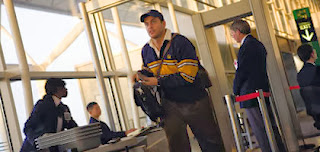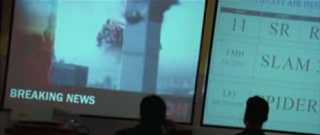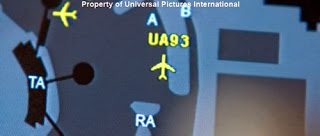Literature
The other day I overheard a DJ on our local radio station talking about how President Obama was in New Orleans that morning. I was reminded of this a couple hours later when, while sitting in the backyard playing with Julien, Air Force One came rumbling by directly overhead. You can't mistake this plane, a 747-200 with its distinctive pale blue belly and four jet engine roar.


On this subject of seeing planes pass by, an essay of mine called "Plane Sighting" was published over at InVisible Culture, in their latest issue called "Blind Spots."
This brief sighting of Air Force One reminded me of an old essay I wrote on the Presidential plane: it's something I've wanted to resuscitate for a while now, and so I went rummaging around various hard drives to see if I could find it. I didn't find it?it's on an old computer up in my office, I think?but I did find an essay on the film United 93 that I had forgotten about. I liked this essay, and even while it's more of a provocation than a fully developed thesis, it was encouraging to read it and realize I'm still puzzling over some of the same issues. So much pops up and fades in the day-to-day of reading, writing, tweeting, and teaching?it's nice to find something from many years ago that I'm still basically interested in, if in new ways. So I'll put this essay below, and I'll keep looking for the essay on Air Force One...

Strangely, we are not too far from one of the more recorded responses to the events of 9/11, when people responded to the World Trade Center explosions with the incredulous observation: ?It was just like a movie.?
Indeed, United 93 does not hesitate to recycle the recorded real-time perception?as well as its mediatization?of this filmic moment. At one point in the movie, when the second World Trade Center tower is hit, Greengrass uses ?real? news footage from 9/11 to re-capture from the expressions of real people (?who were there?) the disbelief and alarm in the New York air traffic control tower and in the military command center. The middle shot that takes up the entire screen is the CNN footage, replete with the iconic red logo in the bottom right-hand corner of the screen.

At another point in the film commentary, Greengrass explains his goal for this film as such: ?[If we] could create a film that allowed an audience to walk through 9/11?at eye level?that would give us some basis for evaluating this enormously important event.? Greengrass?s idea of walking through 9/11 ?at eye level? is a fascinating one, given our geographic displacements and replacements throughout the film: in Newark airport, in the flying plane, and in multiple air traffic control rooms and military command centers on the east coast. While the camera angles are, in effect, positioned at eye-level, and often handheld, the overwhelmingly significant comportment of 9/11 is not perambulation?it is the mechanical action of flight. And, on another level, it is the technical reproducibility of video. United 93 exists for us to evaluate the Event; yet, as we have seen, part of the event was its non-exceptionality on many fronts?it was just another day at the office that became increasingly chaotic.
This complex arrangement calls to mind one of Walter Benjamin?s observations in his famous essay ?The Work of Art in the Age of Mechanical Reproduction,? where he states:
What does one hope to achieve by seeing ?real? people in the place of actors? What does one get from having the Event of 9/11 essentially compromised in its own representation?that is, reproduced in such a way that we can watch how it really must have felt, how it really happened? Not only that, but we can watch this film over and over, being reassured of its reality?its Event-ness. For whom was 9/11 an Event, and what different types of events are at play here?
Back to Nietzsche, albeit in a roundabout way. One of Nietzsche?s aphorisms from Beyond Good and Evil perplexes me every time I think about it: ?Human maturity consists in having found again the seriousness one had as a child, at play.? One possible way of reading this is as a joyous prompt to remain childlike even when an adult: I act the most ?mature? when I am playful, inventive, and silly. Another reading, however, mocks the very notion of human maturity: it is no more than what we felt years ago when we were children playing in a sandbox?as adults we just have that feeling in air traffic control rooms, in military command centers, and on airplanes. We call it maturity, but it is more like a forgetfulness of who and where we are, and what we are doing in any given moment. And a lot of these moments are taken up by work.
As we see consistently throughout United 93, one of the things that 9/11 variously interrupted and highlighted was work. (David Simpson alludes to this point in his shrewd, pithy book 9/11: The Culture of Commemoration.) 9/11 heightened the sense that what people were working for?vacations, mobility, family, work itself?was suddenly on pause, and in certain cases violently threatened. The non-actors in United 93 show us this through their acting. Yet understood as such, does acting show us the really real of work, or is it the really real of work? Paul Greengrass stresses that there is ?a special veracity? in this film. I wonder if the truth of United 93 is nothing more and nothing less than work itself: everyone?s job is to act professional. The film United 93 almost seems to rephrase Nietzsche?s aphorism as such: ?human maturity consists in finding the seriousness one has as an actor, at work.? We are left with the problem of playing ourselves, whether on the screen in lights, or in the darkening real of everyday life.

- Why Do Dreams Need Guns?
I just finished watching Christopher Nolan's most recent film, Inception. I found this movie perplexing on many levels, not the least of which was its relentlessly derivative post-Matrix feel. This included all the fights and guns, which never cease...
- Down On Up
The problems with Pixar?s latest film Up are primarily formal ones. These include the onslaught of events, and a virtual saturation of characters. The events in Up are sequenced irregularly and create strange senses of importance: for instance, the breaking...
- Marley & Me: What Is It?
When I went to Blockbuster yesterday afternoon, I had no intentions to write a post about Marley & Me. But this movie is such a curious oddity, in ways one might not expect from a film touted as "The Perfect Family Comedy!" (Mark Allen, CBS, DVD cover)....
- From Bourdin And Nietzsche To The Genre Of Aphorisms
My letter to The New Yorker was published in the September 15, 2008 issue. It is in reference to a fascinating article by David Grann on Frédéric Bourdin, the French con-man who pretends to be various children. In this letter I juxtapose...
- Top Ten Tuesday: The Ten Best Movie Adaptations
This weeks top ten hosted by The Broke and the Bookish is a very fun topic: the best movie adaptations of literary works. Here is mine: A Scanner Darkly: A Keanu Reeves film that isn't cringe-worthy? You betcha. Richard Linklater is one of the most...
Literature
Plane Sighting, Found Essay
The other day I overheard a DJ on our local radio station talking about how President Obama was in New Orleans that morning. I was reminded of this a couple hours later when, while sitting in the backyard playing with Julien, Air Force One came rumbling by directly overhead. You can't mistake this plane, a 747-200 with its distinctive pale blue belly and four jet engine roar.
Air Force One sighting over my backyard

close up
This brief sighting of Air Force One reminded me of an old essay I wrote on the Presidential plane: it's something I've wanted to resuscitate for a while now, and so I went rummaging around various hard drives to see if I could find it. I didn't find it?it's on an old computer up in my office, I think?but I did find an essay on the film United 93 that I had forgotten about. I liked this essay, and even while it's more of a provocation than a fully developed thesis, it was encouraging to read it and realize I'm still puzzling over some of the same issues. So much pops up and fades in the day-to-day of reading, writing, tweeting, and teaching?it's nice to find something from many years ago that I'm still basically interested in, if in new ways. So I'll put this essay below, and I'll keep looking for the essay on Air Force One...
Not What Nietzsche Had in Mind: United 93 and the Problem of Playing Ourselves

Among other philosophical problems, the 19th-century German philosopher Friedrich Nietzsche struggled to understand how humans perform essentially as actors, playing elaborate roles based on intricate networks of fictions that accrete into ?truth??in other words, how humans function as creative subjects who convert everyday fictions into true realities. Can we ever become objectively aware of our reliance on fabricated truths? Would such awareness lead to enlightened being? Or madness? Or merely result in a nagging sense that living requires certain epistemological blind spots? In his essay ?On Truth and Lying in a Non-Moral Sense,? Nietzsche wonders, ?What do human beings really know about themselves? Are they even capable of perceiving themselves in their entirety just once, stretched out as in an illuminated glass case?? The implicit answers to these questions seem to be that humans know very little about themselves; and, no, humans cannot perceive themselves in their entirety, ?as in an illuminated glass case.?
Yet Nietzsche also glimpses an unsettling total vision, of sorts, in his stringent critique of ?truth? later on in the same essay: ?What, then, is truth? A mobile army of metaphors, metonymies, anthropomorphisms, in short, a sum of human relations which have been subjected to poetic and rhetorical intensification, translation, and decoration, and which, after they have been in use for a long time, strike a people as firmly established, canonical, and binding?.? Given this assessment of truth, how do we proceed to live according to conventions that we know are fictions?particularly when we must come to terms with a certain event?s truth, and our roles in making this truth?how else to put it?come true?
While one might suspect that cinema vérité offers a unique way to view human life in its entirety, as if ?in an illuminated glass case,? I do not think this is exactly what Nietzsche had in mind. Nevertheless, Paul Greengrass, in his 2006 film United 93, perhaps unintentionally rejuvenates Nietzsche?s musings about how people might become aware of playing themselves amidst ?a sum of human relations? that we call truth. This film recreates the events of 9/11, specifically to dramatize the final hijacking that day aboard the eponymous United 93. To make this film, Greengrass cast many non-actors who play ?themselves? in their roles as laborers on the day of 9/11. That is, the movie includes many actual ?professional? workers who willingly recreated the roles that they played on September 11, 2001.
In the director?s commentary on the DVD, Greengrass articulates his project, and his claims on behalf of real people, re-creation, and non-professional actors raise a series of problems and questions. To be precise, I would like to put some pressure on the idea of real people playing themselves. What is at stake in Greengrass?s conception of a cinema that can get closer to the lived truth of the everyday? What does it actually mean to be able to play oneself, to desire to re-create a past moment on the screen? Here is part of Greengrass?s commentary:
?it was important to me that this film seemed to be about people who were just like anyone of us?part of the idea of 9/11 is that it is an event that engulfed US?it didn?t belong to a rarified world of movie stars?it belonged in the everyday, in the here and now?[the presence of professional air traffic controllers] gives this scene a special veracity?because?in the end?who better to play air traffic controllers?who better to bring this thing to realistic screen portrayal than professional people themselves?A film that seems to be about people ?just like anyone of us??that is, a film that doesn?t even come off as a film, but as life itself? How would we even recognize ourselves as audiences to such a mundane show? This seems to be an awkward imperative for how to live as if one?s life is routinely insignificant?yet also always harboring a potential for great cinematic truth. The ?rarified world of movie stars? is differentiated from the everyday; but isn?t it precisely this rarified world that does occupy audiences everyday, in cinemas around the world? Can we actually pull apart these two ?worlds? as if they are distinct? Finally, where is the ?here and now? of flight United 93? This airline specific designator has been engulfed by the aura of filmmaking; it has been re-spectacled within a double frame of serious entertainment. Have the particulars of this flight been made more real or less real?or differently real?by its having been simulated for the screen? And how do these professionals, these non-actors, contribute to this reality shift?
Strangely, we are not too far from one of the more recorded responses to the events of 9/11, when people responded to the World Trade Center explosions with the incredulous observation: ?It was just like a movie.?
Indeed, United 93 does not hesitate to recycle the recorded real-time perception?as well as its mediatization?of this filmic moment. At one point in the movie, when the second World Trade Center tower is hit, Greengrass uses ?real? news footage from 9/11 to re-capture from the expressions of real people (?who were there?) the disbelief and alarm in the New York air traffic control tower and in the military command center. The middle shot that takes up the entire screen is the CNN footage, replete with the iconic red logo in the bottom right-hand corner of the screen.

I am not critiquing the merits of Greengrass?s filmmaking here, nor am I trying to flare up the controversial status of these clips; rather, I am intrigued by the conception of human life forwarded by such images. What is this film saying about what it means to be a human? Are we being called upon to realize just how enmeshed we are in a ?society of the spectacle??or does this film get even more tangled up as it tries to puncture the surface of images with the sharpness of the really real? The layers of mediation are dense and interpenetrating.
At another point in the film commentary, Greengrass explains his goal for this film as such: ?[If we] could create a film that allowed an audience to walk through 9/11?at eye level?that would give us some basis for evaluating this enormously important event.? Greengrass?s idea of walking through 9/11 ?at eye level? is a fascinating one, given our geographic displacements and replacements throughout the film: in Newark airport, in the flying plane, and in multiple air traffic control rooms and military command centers on the east coast. While the camera angles are, in effect, positioned at eye-level, and often handheld, the overwhelmingly significant comportment of 9/11 is not perambulation?it is the mechanical action of flight. And, on another level, it is the technical reproducibility of video. United 93 exists for us to evaluate the Event; yet, as we have seen, part of the event was its non-exceptionality on many fronts?it was just another day at the office that became increasingly chaotic.
This complex arrangement calls to mind one of Walter Benjamin?s observations in his famous essay ?The Work of Art in the Age of Mechanical Reproduction,? where he states:
By close-ups of the things around us, by focusing on hidden details of familiar objects, by exploring commonplace milieus under the ingenious guidance of the camera, the film, on the one hand, extends our comprehension of the necessities which rule our lives; on the other hand, it manages to assure us of an immense and unexpected field of action.It would seem that United 93 carries out these twin movements in spectacular form. On the one hand, the film explores ?the commonplace under the ingenious guidance of the camera??for instance, Greengrass used a pulley system to move the camera up and down the aircraft aisle to achieve a fluid, eye-level effect. We see the ?hidden details? of the cockpit, the galley, and even the lavatory when the would-be hijacker constructs a fake fake bomb above the toilet. The film ?extends our comprehension of the necessities which rule our lives??so not only is the everyday exposed, but it is also reinforced, normalized, accepted as such. But this is not so much even in the content of the film as it is in the idea of what it means to act like ourselves. Thus the film also assures us of the ?immense and unexpected field of action? that we call life?the movie heightens our expectation for drama even as it insists on the banal.
What does one hope to achieve by seeing ?real? people in the place of actors? What does one get from having the Event of 9/11 essentially compromised in its own representation?that is, reproduced in such a way that we can watch how it really must have felt, how it really happened? Not only that, but we can watch this film over and over, being reassured of its reality?its Event-ness. For whom was 9/11 an Event, and what different types of events are at play here?
Back to Nietzsche, albeit in a roundabout way. One of Nietzsche?s aphorisms from Beyond Good and Evil perplexes me every time I think about it: ?Human maturity consists in having found again the seriousness one had as a child, at play.? One possible way of reading this is as a joyous prompt to remain childlike even when an adult: I act the most ?mature? when I am playful, inventive, and silly. Another reading, however, mocks the very notion of human maturity: it is no more than what we felt years ago when we were children playing in a sandbox?as adults we just have that feeling in air traffic control rooms, in military command centers, and on airplanes. We call it maturity, but it is more like a forgetfulness of who and where we are, and what we are doing in any given moment. And a lot of these moments are taken up by work.
As we see consistently throughout United 93, one of the things that 9/11 variously interrupted and highlighted was work. (David Simpson alludes to this point in his shrewd, pithy book 9/11: The Culture of Commemoration.) 9/11 heightened the sense that what people were working for?vacations, mobility, family, work itself?was suddenly on pause, and in certain cases violently threatened. The non-actors in United 93 show us this through their acting. Yet understood as such, does acting show us the really real of work, or is it the really real of work? Paul Greengrass stresses that there is ?a special veracity? in this film. I wonder if the truth of United 93 is nothing more and nothing less than work itself: everyone?s job is to act professional. The film United 93 almost seems to rephrase Nietzsche?s aphorism as such: ?human maturity consists in finding the seriousness one has as an actor, at work.? We are left with the problem of playing ourselves, whether on the screen in lights, or in the darkening real of everyday life.

- Why Do Dreams Need Guns?
I just finished watching Christopher Nolan's most recent film, Inception. I found this movie perplexing on many levels, not the least of which was its relentlessly derivative post-Matrix feel. This included all the fights and guns, which never cease...
- Down On Up
The problems with Pixar?s latest film Up are primarily formal ones. These include the onslaught of events, and a virtual saturation of characters. The events in Up are sequenced irregularly and create strange senses of importance: for instance, the breaking...
- Marley & Me: What Is It?
When I went to Blockbuster yesterday afternoon, I had no intentions to write a post about Marley & Me. But this movie is such a curious oddity, in ways one might not expect from a film touted as "The Perfect Family Comedy!" (Mark Allen, CBS, DVD cover)....
- From Bourdin And Nietzsche To The Genre Of Aphorisms
My letter to The New Yorker was published in the September 15, 2008 issue. It is in reference to a fascinating article by David Grann on Frédéric Bourdin, the French con-man who pretends to be various children. In this letter I juxtapose...
- Top Ten Tuesday: The Ten Best Movie Adaptations
This weeks top ten hosted by The Broke and the Bookish is a very fun topic: the best movie adaptations of literary works. Here is mine: A Scanner Darkly: A Keanu Reeves film that isn't cringe-worthy? You betcha. Richard Linklater is one of the most...
